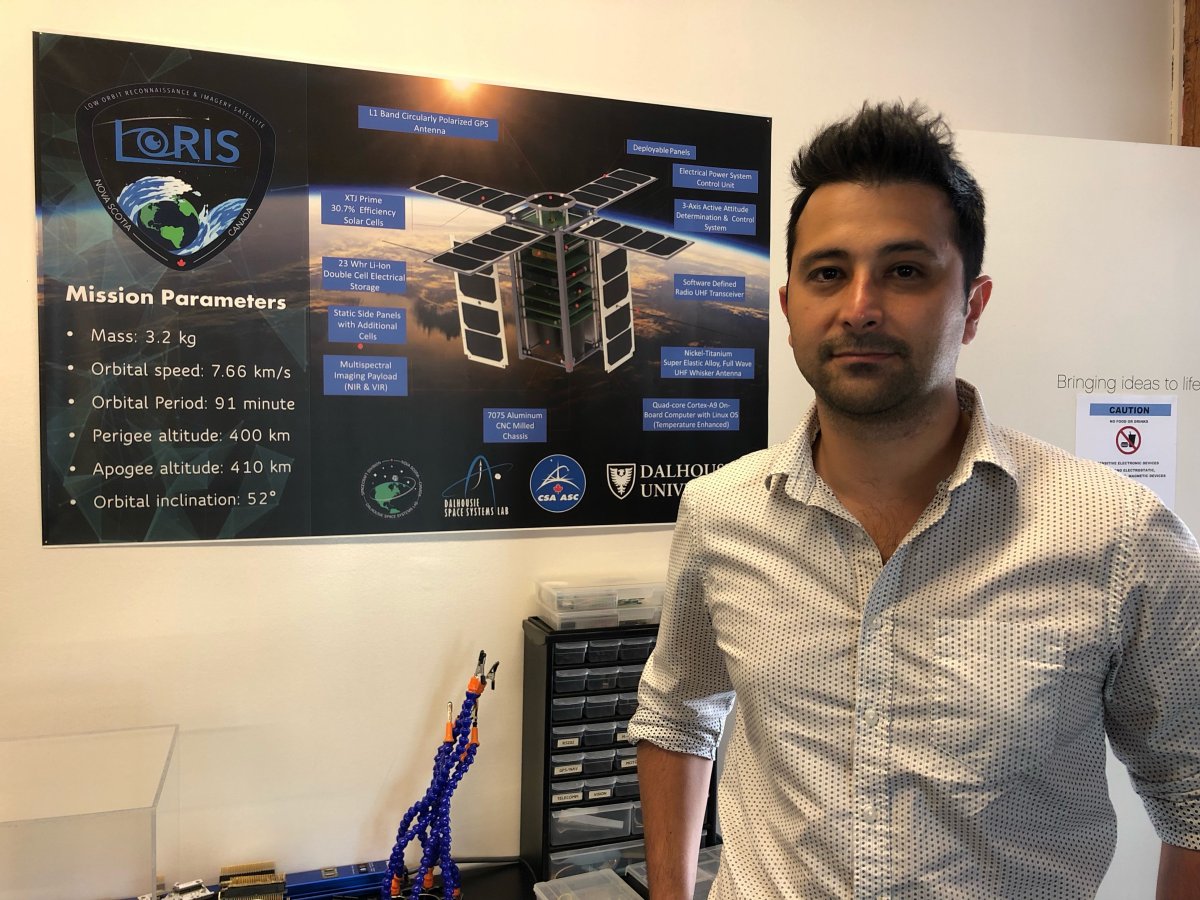A tiny satellite built in Nova Scotia is ready to blast off into outer space.
LORIS, which stands for low-orbit reconnaissance imagery satellite, is a nanosatellite, designed and built by students at Dalhousie University’s Space Systems Lab. It’s 20 centimetres tall by 10 centimetres wide and weighs just under two kilograms.
Project lead and space lab founder Arad Gharagozli said it’s a “surreal feeling” seeing LORIS finished.
“It’s been four years that really encapsulated everyone’s life to some extent,” he said.
“We are obviously so excited and cannot wait for it to send us the first signal.”
The work was funded by the Canadian Space Agency as part of its CubeSat project, which was announced in 2017. LORIS is one of 15 CubeSats being built at post-secondary institutions across the country, but it’s among the first to be completed.
Read more:
University of Alberta space team receives funding to launch second satellite
LORIS will go on a resupply mission to the International Space Station, and once onboard, the plan is to launch it into orbit sometime in November.
Its main mission is to test new technologies that have yet to see the darkness of space.
“A lot of research has gone into LORIS, anywhere from battery research into material research and software and mechanical, so one of the things LORIS will do is it will bring that research into space and then we can see how it actually performs,” said Gharagozli, adding it’s also equipped with specialized cameras.

Gharagozli, who has since founded Galaxia, a space systems company in Halifax, said miniaturization is the new wave of space exploration.
Ashley Field/Global NewsMore than 250 students helped with the project — now-engineering graduate Lucas Rowlands worked on LORIS’s electronic power system for his final-year project.
“For our project we designed the deployment board, which is the burn wire circuitry that would cut the cables on the wire that would then release the solar panels once it’s out in space,” said Rowlands.
He said while he always knew LORIS was destined for the stars, it “hasn’t quite hit him” that it will soon be off to space.
“The whole time you’re working on it, in the back of your mind it’s like, ‘Oh, this is going to space.’ And then, that kind of dies down a bit while you’re focusing more on getting the actual work done,” he said. “But now that it’s done and we’re getting to the final stages of implementation, it’s exciting to know that it’s going to be launched and stuff that we worked on and touched is going to be orbiting the earth.”
Gharagozli, who has since founded Galaxia, a space systems company in Halifax, said miniaturization is the new wave of space exploration.
Read more:
‘Exceptional day’ — Canadian scientists rejoice successful launch of space telescope
“The ultimate goal is: how do you make these as small as possible and as light as possible so you don’t pay for that experiment up front? And nanosatellites can do that very effectively and efficiently,” he said, adding that LORIS is a perfect example of that.
“It’s about (the size) of a one-litre carton of milk, so it’s not big, and that’s one of the things about nanosatellites that makes it very appealing, because the cost of launch — it’s reduced significantly — but it’s still somewhere between $40,000 to $45,000 per kilo to launch.”
He applauds the Canadian Space Agency for backing the CubeSat project, allowing him and his team to focus on technology development without worrying about the finances.
“We really need in Canada to be competitive on a global landscape when it comes to space exploration or earth observation, so we are hoping that projects like this will continue, because without it, it would almost be impossible to do things like this on private funding,” he said.
“The more we can do of this, more we can learn and more technologies can come out of Canada that, again, we desperately need to be competitive on this landscape right now.”
© 2022 Global News, a division of Corus Entertainment Inc.
https://news.google.com/__i/rss/rd/articles/CBMiRGh0dHBzOi8vcTEwNy5jb20vbmV3cy84OTI2MzYwL25hbm9zYXRlbGxpdGUtYnVpbHQtbm92YS1zY290aWEtc3BhY2Uv0gEA?oc=5
2022-06-16 21:17:58Z
CBMiRGh0dHBzOi8vcTEwNy5jb20vbmV3cy84OTI2MzYwL25hbm9zYXRlbGxpdGUtYnVpbHQtbm92YS1zY290aWEtc3BhY2Uv0gEA
Tidak ada komentar:
Posting Komentar